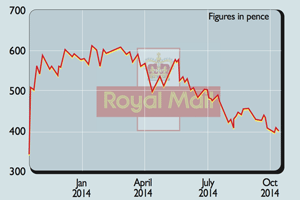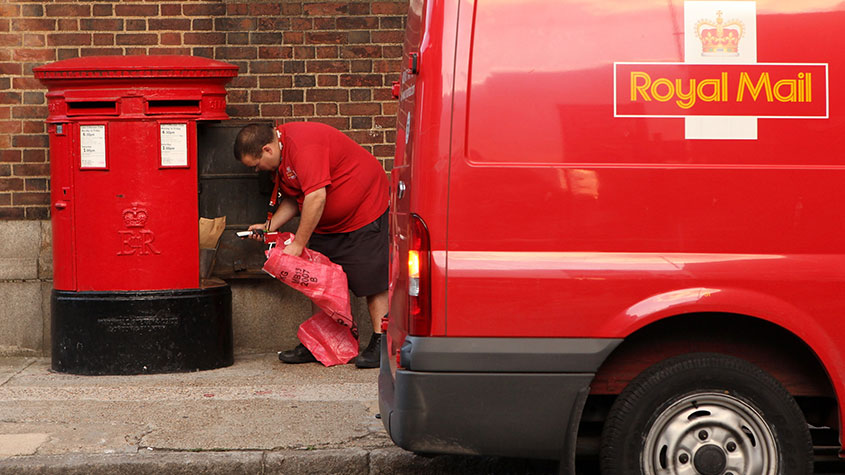Shares in focus: Can Royal Mail deliver profits?
Pessimism surrounds the mail service’s prospects. Is it overblown, and should you buy the shares? Phil Oakley investigates.
Get the latest financial news, insights and expert analysis from our award-winning MoneyWeek team, to help you understand what really matters when it comes to your finances.
You are now subscribed
Your newsletter sign-up was successful
Want to add more newsletters?

Twice daily
MoneyWeek
Get the latest financial news, insights and expert analysis from our award-winning MoneyWeek team, to help you understand what really matters when it comes to your finances.

Four times a week
Look After My Bills
Sign up to our free money-saving newsletter, filled with the latest news and expert advice to help you find the best tips and deals for managing your bills. Start saving today!
Pessimism about the mail service's prospects may be overdone, says Phil Oakley.
You should never be surprised how quickly people can change their minds about a share. When Royal Mail was floated on the stock exchange a year ago, there were accusations that the government had sold the business off cheaply at 330p per share.
Some City analysts talked about the hidden property value contained in three London sites. Others focused on the potential for cost cutting and the growth of the parcels business. The shares soared on their first day of trading and soon exceeded 600p.
MoneyWeek
Subscribe to MoneyWeek today and get your first six magazine issues absolutely FREE

Sign up to Money Morning
Don't miss the latest investment and personal finances news, market analysis, plus money-saving tips with our free twice-daily newsletter
Don't miss the latest investment and personal finances news, market analysis, plus money-saving tips with our free twice-daily newsletter
How times have changed. Today it seems that investors are decidedly downbeat about the company's prospects. Since the summer the shares have retreated rapidly back towards their flotation prices. It's undoubtedly true that there are things to worry about. But have the same people who were arguably too optimistic a year ago become too pessimistic now?
Royal Mail's risks aren't new
The flotation of Royal Mail is a good example of how the City works. Initial public offerings (IPOs) are very profitable for stockbrokers. They provide big fees relative to the amount of work done.
So brokers have an incentive to accentuate the positive about a company and give the IPO the best chance of being a success.
To be fair to them, the Royal Mail float has been done well no one subscribing for shares has lost money so far.
Yet the most valuable bit of information that investors get from an IPO is in a prospectus. Like annual reports, most people can't be bothered to take the time to read them. This is a shame because there's loads of valuable information in them. Most of the worries about Royal Mail shares today were highlighted in the prospectus.
Royal Mail is facing lots of uncertainty about its business. Parcels were supposed to provide the main route to higher profits and dividends in the years ahead as the number of letters fell. Unfortunately, the parcels business seems to have hit something of a brick wall. Revenue growth has all but disappeared.
What seems to be going on in this market is a classic example of too many companies chasing too little business. Competitors such as UK Mail and TNT have warned that business isn't healthy.
Small parcels companies are trying to keep their delivery vans busy by cutting prices. This means less money for everyone. Royal Mail's business has also been hurt by Amazon's decision to start delivering more of its orders itself.
But there are other issues as well. Royal Mail must deliver to all areas of the country at the same prices known as the universal service obligation. This means it has to have staff, delivery vans and sorting offices in place to do this job.
More importantly, it needs to charge enough money to make a profit in urban areas to offset the losses incurred when delivering letters and parcels to more remote places.
Royal Mail is arguing that this service is being put at risk by competition. Rivals such as TNT are looking to cherry-pick customers in cities without the obligation to deliver everywhere. TNT aims to cover 42% of UK addresses by 2017.
This has the potential to knock a big hole in Royal Mail's profits. It estimates that TNT could reduce its revenue by as much as £200m in 2017.
Reasons to be cheerful
But it's not all doom and gloom. Royal Mail is making good progress on cutting costs. It's also improving the service it offers to customers, with Sunday deliveries and more flexible collections for households.
There are also opportunities to get a bigger slice of markets such as parcel returns. Add in the fact that big spending on business improvements will soon end and give a large boost to the company's free cash flow. This will allow it to keep on paying a decent dividend and reducing its debt. In fact, it is entirely possiblethat Royal Mail could be debt free within five years.
Note that City analysts are not yet predicting that profits will start falling.If that turns out to be correct, then there's a case for saying that Royal Mail shares are quite cheap. At the current share price of 394p and expected year-end debts of just over £400m, the market value of Royal Mail's assets (its enterprise value) is just over £4.3bn.
With expected operating profits this year of £495m, this means the whole business is currently valued at a respectable earnings before interest and tax (EBIT) yield of 11.4%.
If profits can stay at their predicted level, then this looks like a very good deal. Throw in a prospective dividend yield of 5.4%, backed by strong finances, and Royal Mail shares might just be worth buying right now.
Verdict: buy
Royal Mail (LSE: RMG)


Buy: 7
Hold: 10
Sell: 7
Target price: 457p
Directors' shareholdings
M Green (CEO): 3,759
M Lester (CFO): 3,759
D Brydon (Chair): 15,530
Get the latest financial news, insights and expert analysis from our award-winning MoneyWeek team, to help you understand what really matters when it comes to your finances.
Phil spent 13 years as an investment analyst for both stockbroking and fund management companies.
-
 Should you buy an active ETF?
Should you buy an active ETF?ETFs are often mischaracterised as passive products, but they can be a convenient way to add active management to your portfolio
-
 Power up your pension before 5 April – easy ways to save before the tax year end
Power up your pension before 5 April – easy ways to save before the tax year endWith the end of the tax year looming, pension savers currently have a window to review and maximise what’s going into their retirement funds – we look at how
-
 Royal Mail’s 7.2% dividend yield is now under threat
Royal Mail’s 7.2% dividend yield is now under threatTips Royal Mail's dividend yield is coming under pressure as costs rise and delivery volumes fall. Profits are under threat, and investors can't take anything for granted, says Rupert Hargreaves.
-
Share tips of the week
Features MoneyWeek’s comprehensive guide to the best of this week’s share tips from the rest of the UK's financial pages.
-
 If you’d invested in: Wizz Air and Royal Mail
If you’d invested in: Wizz Air and Royal MailFeatures Wizz Air is the largest low-cost airline in central and eastern Europe – and it is flying high.
-
Company in the news: Royal Mail
Features Phil Oakley explains what the dramatic collapse of competitor City Link means for Royal Mail.
-
Company in the news: Royal Mail Group
Features Shares in Royal Mail were a steal at their flotation price, but have now fallen back as the company has run into a few problems. Phil Oakley asks if it's time to buy.
-
Company in the news: Royal Mail Group
Features Royal Mail shares looked tempting before the float. But, now the shares have risen in price, is it too late to buy? Phil Oakley reports.
-
Was the Royal Mail sold off too cheaply?
Features Was the British public betrayed by an overzealous government in the Royal Mail sell-off? Emily Hohler reports.
-
Royal Mail shares soar to new highs - should you bank profits?
Features As ‘unconditional trading’ starts in Royal Mail shares, the price has soared to new highs. Ed Bowsher looks at whether you should sell now, or hold on to them.